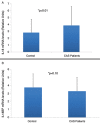Increased Expression of Interleukin-18 mRNA is Associated with Carotid Artery Stenosis
- PMID: 29485097
- PMCID: PMC5981122
- DOI: 10.4274/balkanmedj.2017.0323
Increased Expression of Interleukin-18 mRNA is Associated with Carotid Artery Stenosis
Abstract
Background: Carotid artery stenosis is the atherosclerotic narrowing of the proximal internal carotid artery and one of the primary causes of stroke. Elevated expression of the pleiotropic proinflammatory cytokine interleukin-18 has been demonstrated in human atherosclerotic plaques.
Aims: To investigate whether the mRNA expression levels of interleukin-18 and interleukin-18-binding protein and interleukin-18 −137 G/C (rs187238) variants are associated with carotid artery stenosis development.
Study design: Case-control study.
Methods: The mRNA expression levels of interleukin-18 and interleukin-18-binding protein and interleukin-18 rs187238 variants were evaluated by quantitative real-time polymerase chain reaction and real-time polymerase chain reaction, respectively, in the peripheral blood mononuclear cells of 70 patients with carotid artery stenosis (36 symptomatic, 34 asymptomatic) and 75 healthy controls.
Results: Interleukin-18 mRNA expression was significantly increased in carotid artery stenosis patients compared to that in healthy controls (p=0.01). However, no significant difference was observed between interleukin-18-binding protein mRNA expression levels in patients with carotid artery stenosis and those in controls (p=0.101). Internal carotid artery stenosis severity was significantly higher in symptomatic patients than that in asymptomatic patients (p<0.001). A significant relationship was identified between interleukin-18 expression and internal carotid artery stenosis severity in patients with carotid artery stenosis (p=0.051). Interleukin-18 rs187238 polymorphism genotype frequencies did not significantly differ between patients with carotid artery stenosis and controls (p=0.246). A significant difference was identified between interleukin-18-binding protein gene expression and symptomatic and asymptomatic patients (p=0.026), but there was no difference in interleukin-18 expression between the symptomatic and asymptomatic subgroups (p=0.397).
Conclusion: Interleukin-18 mRNA expression may affect carotid artery stenosis etiopathogenesis and internal carotid artery stenosis severity and also may play a mechanistic role in the pathogenesis of carotid artery stenosis, influencing the appearance of symptoms.
Keywords: Carotid artery; gene expression; interleukin-18; interleukin-18-binding protein; stenosis.
Conflict of interest statement
Figures
References
-
- Della-Morte D, Guadagni F, Palmirotta R, Testa G, Caso V, Paciaroni M, et al. Genetics of ischemic stroke, stroke-related risk factors, stroke precursors and treatments. Pharmacogenomics. 2012;13:595–613. - PubMed
-
- Daly C, Rodriguez HE. Carotid artery occlusive disease. Surg Clin North Am. 2013;93:813–32. - PubMed
-
- Golledge J, Siew DA. Identifying the carotid ‘high risk’ plaque: is it still a riddle wrapped up in an enigma? Eur J Vasc Endovasc Surg. 2008;35:2–8. - PubMed
-
- Ross R. Atherosclerosis: an inflammatory disease. N Engl J Med. 1999;340:115–26. - PubMed
-
- Okamura H, Tsutsui H, Komatsu T, Yutsudo M, Hakura A, Tanimoto T, et al. Cloning of a new cytokine that induces IFN-gamma production by T cells. Nature. 1995;378:88–91. - PubMed
Publication types
MeSH terms
Substances
LinkOut - more resources
Full Text Sources
Other Literature Sources
Miscellaneous

